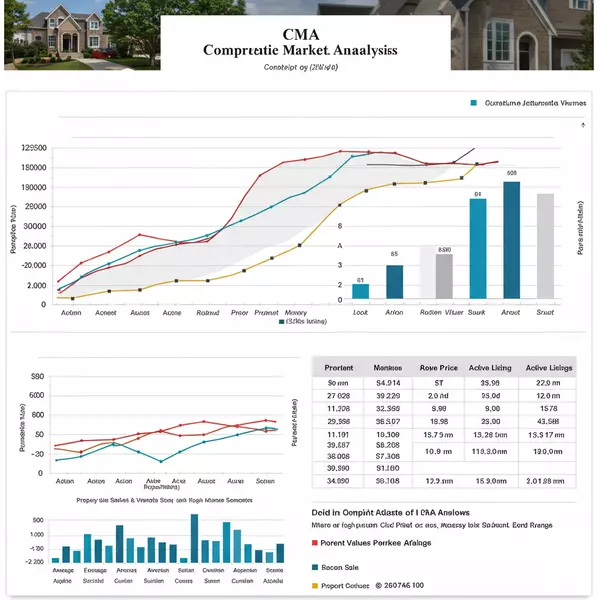Navigating the real estate market while managing PCS orders is one of the most stressful challenges military families face. This comprehensive selling my home during pcs guide walks you through every decision point, from determining whether to sell or rent to coordinating closings across time zones.
Whether you're dealing with your first PCS or your fifth, you'll find actionable strategies, financial insights, and backup plans that address the unique pressures of military moves—because selling a home in 60 days while out-processing requires more than generic real estate advice.

Understanding PCS and Its Impact on Homeownership
A Permanent Change of Station (PCS) means more than just a new assignment—it's a complete life transition that affects every aspect of your family's stability, including your home. Unlike civilian moves with flexible timelines, PCS orders typically give you 30-90 days to relocate, creating urgent decisions about one of your biggest financial assets.
The compressed timeline transforms what's normally a methodical process into a high-stakes sprint. You're not just selling a house; you're managing inspections, negotiations, and closings while coordinating movers, out-processing, and preparing your family for upheaval. Understanding this unique pressure is the first step to navigating it successfully.
Key Timeline Milestones to Track:
- Orders receipt to first listing: 2-3 weeks (if prepped)
- Average days on market (military areas): 30-45 days
- Contract to closing: 30-45 days
- Ideal start: List 60-90 days before PCS departure

Preparing Your Home for Maximum Appeal
First Impressions Win
Military buyers understand temporary housing's limitations—they're looking past your personal effects to envision their family's life here. Depersonalize aggressively: Remove family photos, military memorabilia, and unit plaques. Paint bold walls in neutral tones. Your goal is creating a blank canvas where buyers see potential, not your past.
Curb appeal sets expectations before prospects open the door. Fresh mulch, trimmed hedges, and a power-washed driveway signal a well-maintained property. These $200 investments return thousands in perceived value.
Quick-Win Curb Appeal Checklist:
- Power wash driveway, walkways, and siding
- Replace worn door mats and update house numbers
- Add potted plants flanking the front door
- Repair any visible cracks in concrete or asphalt
- Ensure exterior lights work and bulbs match
- Trim trees/bushes blocking windows or pathways
Strategic Repairs and Staging
Focus on fixes that prevent inspection red flags: leaky faucets, cracked outlets, loose railings. Don't renovate—you won't recoup costs under PCS timelines. Instead, ensure everything functions properly.
Professional photography is non-negotiable in today's digital-first market. Quality images generate 47% more inquiries and justify higher asking prices. Budget $300-500 for a photographer who understands how to showcase spaces.
Pre-Inspection Repair Priorities:
- HVAC systems: Service and replace filters
- Plumbing: Fix drips, running toilets, low pressure
- Electrical: Replace non-working outlets/switches
- Safety items: Test smoke/CO detectors, secure railings
- Cosmetic fixes: Patch holes, touch up paint, caulk gaps
Staging That Sells
Military buyers appreciate functionality. Stage rooms to show purpose: dining tables set for family meals, home offices organized for productivity, bedrooms that feel restful. Remove excess furniture to make spaces feel larger.
Neutral doesn't mean sterile. Add warmth through simple touches: fresh flowers, quality throw pillows, ambient lighting. These create emotional connections that translate to offers.

Legal and Financial Considerations
VA Loan Advantages
Loan assumption can be your selling advantage. Buyers taking over your VA loan inherit your interest rate—valuable in high-rate environments. This feature attracts buyers who might not otherwise afford the home and can justify premium pricing.
Not all VA loans are assumable, and lenders must approve buyers' creditworthiness. The process takes 45-60 days, so factor this into your timeline. Your liability continues until assumption completes, making buyer vetting critical.
VA Loan Assumption Benefits:
- Buyers inherit your (potentially lower) interest rate
- Reduced closing costs for buyers
- Faster approval than new loan origination
- Unique selling point in competitive markets
- Appeals to military and non-military buyers alike
Tax Protection
The capital gains exclusion ($250K single, $500K married) applies if you've lived in the home 2 of the past 5 years. Military members get special treatment: periods on qualified extended duty don't count against the 5-year window, potentially saving thousands in taxes.
Document everything: orders, deployment dates, duty station changes. This paperwork substantiates your exclusion claims and protects against IRS challenges.
Tax Documentation Checklist:
- All PCS orders with dates and locations
- Mortgage interest statements (1098 forms)
- Property tax payment records
- Home improvement receipts (increase cost basis)
- Settlement statements from purchase and sale
- Rental income/expense records if applicable
SCRA Protections
The Servicemembers Civil Relief Act caps mortgage interest at 6% during active duty and provides foreclosure protections. While selling, these protections continue until closing, giving you legal leverage if financial pressures mount during transition.
SCRA also protects lease agreements. If you're renting while selling your home, you can break your lease without penalty with PCS orders and 30 days' notice.

Deciding Whether to Sell or Rent
The Selling Route
Selling offers clean closure. You eliminate mortgage payments, property management headaches, and the emotional tie to your old duty station. It frees up your VA loan entitlement for your next location and provides capital for your next down payment or emergency fund.
However, timing risk is real. If your local market is soft or inventory is high, you might sell below value or struggle to close before PCS. You'll also lose potential property appreciation and passive income opportunities.
Selling Makes Sense When:
- You're approaching VA loan entitlement limits
- Local rental market is weak or oversaturated
- Property needs major repairs you can't afford
- You're PCSing overseas without return plans
- Market conditions favor sellers significantly
The Rental Option
Renting preserves your investment while generating monthly income that can exceed your mortgage payment. Property values typically appreciate over time, and you maintain a tangible asset in an area you might return to.
The tradeoffs? You become a long-distance landlord dealing with maintenance calls, tenant screening, and potential vacancies. Property management companies can help but take 8-10% of rental income. You'll also need to verify your VA loan allows rentals without triggering due-on-sale clauses.
Renting Works Best When:
- Monthly rent exceeds mortgage payment by 25%+
- You're stationed within driving distance initially
- Property is in high-demand military housing area
- You plan to return to the area within 3-5 years
- You have emergency fund for repairs and vacancies
Financial Reality Check
Your VA loan status matters significantly. If you're using your full entitlement, selling restores it immediately. Renting while carrying a VA loan may limit your buying power at your next station. Run the numbers with a military-friendly financial advisor who understands BAH, tax implications, and deployment scenarios.
Consider this: if your mortgage is $1,800 but market rent is only $1,600, you're losing $200 monthly plus maintenance costs. That's $2,400+ annually before considering property management fees or vacancy periods.

Pricing and Market Strategy
Know Your Worth
A Comparative Market Analysis (CMA) from a military-friendly agent reveals what similar homes actually sold for (not listed for) in the past 90 days. This data-driven approach prevents overpricing that causes listings to stagnate or underpricing that leaves money on the table.
Pay attention to "days on market" trends. Homes sitting 60+ days signal overpricing or property issues. Your first two weeks listed generate maximum buyer interest—price competitively to capitalize on that window.
Pricing Strategy Factors:
- Sold comparables: Similar size, age, condition within 1 mile
- Active competition: Current listings competing for same buyers
- Market velocity: How quickly inventory moves in your area
- Seasonal timing: Premium during PCS season, discount in winter
- Condition adjustments: Updated vs. dated homes command different prices
Targeting Military Buyers
Military families understand PCS urgency and often have financing advantages through VA loans. List on MilitaryByOwner.com and AHRN.com alongside traditional MLS platforms. Highlight features military buyers value: proximity to base gates, quality school districts, and move-in ready condition.
Timing matters. PCS season (May-August) brings maximum military buyer activity. If possible, list 4-6 weeks before peak season to capture early movers with fewer competing listings.
Marketing Highlights That Resonate:
- Distance to base gates (in minutes, not miles)
- School district ratings and boundary maps
- Recent updates with dates and warranties
- Energy-efficient features (lower utility bills)
- Storage space (military families accumulate gear)
- Flexible spaces (home office for telework)
Smart Showing Strategies
Accommodate urgent schedules. Military buyers house-hunt on compressed timelines, often viewing 10+ properties in a weekend. Make your home available for showings with minimal notice, including evenings and weekends.
Consider offering virtual tours for buyers PCSing from distant locations. A quality video walkthrough helps them shortlist properties before flying in for final decisions.

Working with Military-Savvy Professionals
The MRP Difference
Agents with Military Relocation Professional (MRP) certification understand PCS urgency, VA loan nuances, and military buyer priorities. They navigate compressed timelines, communicate with overseas sellers, and leverage military-specific marketing channels that civilian-focused agents often miss.
Interview at least three agents. Ask about their military experience (personal or professional), average days-on-market for military area listings, and communication plans if you PCS before closing.
Questions to Ask Potential Agents:
- How many military clients have you represented this year?
- What's your average list-to-sale price ratio?
- Do you have MRP or similar military-focused credentials?
- How will you communicate if I'm overseas or in transit?
- What's your strategy for marketing to military buyers?
- Can you provide references from recent military sellers?
Property Management Backup
If selling falls through, having a property manager identified provides peace of mind. Interview candidates before PCS orders, verify they understand military tenant needs, and confirm they'll handle lease renewals around future deployment schedules.
Expect to pay 8-10% of monthly rent plus markup on maintenance costs. Reputable managers offer 24/7 emergency response, tenant screening, lease enforcement, and detailed financial reporting.
Property Manager Evaluation Criteria:
- Experience with military tenant base
- Maintenance network and emergency response times
- Tenant screening process and eviction procedures
- Technology platform for rent collection and reporting
- Fee structure (monthly percentage, leasing fees, markup)
- Insurance requirements and liability protection

Coordinating the Sale with Your PCS Move
Timing the Closing Dance
Ideal scenario: Close 2-3 weeks before your PCS report date. This allows furniture removal, final cleaning, and travel time without overlap stress. Reality often differs—prepare contingencies for early or delayed closings.
If closing occurs after departure, grant your real estate attorney or trusted family member power of attorney. Ensure this document specifically covers real estate transactions and is notarized before leaving.
Closing Coordination Checklist:
- Schedule final walkthrough 24-48 hours before closing
- Arrange movers for 3-5 days before closing date
- Plan cleaning service after furniture removal
- Transfer utilities effective closing date
- Update address with USPS, banks, insurance
- Secure important documents (take with you, don't pack)
Managing Two Mortgages Temporarily
If you purchase before selling, prepare financially for carrying both properties. Most lenders require 6 months' reserves when approving concurrent mortgages. This temporary squeeze strains budgets but maintains flexibility.
Your BAH typically covers only one mortgage. Budget carefully, tap emergency funds if needed, and price aggressively to minimize dual-payment periods.
The Virtual Closing Option
Deployed or stationed overseas? Electronic notarization and wire transfers handle most closing logistics remotely. Your title company coordinates document delivery to APO/FPO addresses, and some states allow fully digital closings via video conference.
Verify your chain of command supports time away for closing activities. Some commands grant administrative leave for PCS-related real estate transactions.

When Plans Change: Backup Strategies
Seller Rent-Back Agreements
Negotiating to stay post-closing bridges the gap between your sale date and PCS departure. Buyers often accept reasonable terms (market-rate rent, 30-60 days max, security deposit) because it secures their purchase without vacancy risk.
Put everything in writing. Specify rent amount, duration, utility responsibilities, maintenance obligations, and what happens if your departure delays. Your closing attorney should draft this as part of the purchase agreement.
Rent-Back Negotiation Tips:
- Offer market-rate rent (not below to avoid complications)
- Limit duration to 30-60 days maximum
- Provide security deposit equal to one month's rent
- Clarify who maintains lawn, utilities, minor repairs
- Include early termination clause if PCS moves up
- Get proper insurance coverage for this transition period
Price Reduction Strategy
If your home sits without offers beyond 30 days, reassess pricing. Military markets move quickly—extended listings signal problems (real or perceived). A strategic price reduction often generates renewed interest and multiple offers.
Consider 3-5% reductions rather than small increments. Significant cuts trigger new search alerts for buyers who'd previously filtered out your price point.
When to Reduce Listing Price:
- No showings after first week: 3-5% reduction immediately
- Showings but no offers after 21 days: 2-3% reduction
- One low offer after 30 days: Consider 5-7% reduction
- Approaching PCS date with no activity: Aggressive pricing
The HAP Safety Net
The Homeowners Assistance Program helps military members facing financial loss when PCS orders force home sales in declining markets. Eligibility is narrow, but if you're selling due to BRAC or experiencing significant loss, HAP can provide purchase price compensation.
Application requires extensive documentation: two appraisals, listing history, financial statements, and PCS orders. The process takes 60-90 days, so start early if you anticipate needing assistance.
Distance Management Reality
Renting from across the country or overseas requires systems: automated rent collection, pre-approved maintenance budgets, annual inspections, and 24-hour emergency contacts. Without these structures, a $1,200 rental income becomes a $2,000 headache.
Set aside 20-25% of rental income for maintenance, vacancies, and property management. This buffer prevents financial stress when HVAC systems fail or tenants break leases mid-deployment.
Long-Distance Landlord Essentials:
- Property management company with military experience
- Automated rent collection through property management software
- Pre-approved emergency repair budget ($500-1000)
- Annual in-person or third-party property inspection
- Detailed lease agreements with military clause protections
- Landlord insurance policy with liability coverage
- Local attorney or real estate professional on retainer

Pro Tips from Military Families Who've Been There
Start Early, Even Without Orders
"We began staging and minor repairs six months before orders. When they came, we listed within 10 days and had an offer in three." - Army Captain, Ft. Bragg to Germany PCS
Leverage Your Network
Military communities are tight-knit. Post on unit Facebook groups, ask colleagues for agent recommendations, and tap friends who've sold recently for lessons learned. Personal referrals often lead to the best professionals.
Document Everything Digitally
Scan every document: purchase records, improvement receipts, warranty information, PCS orders, mortgage statements. Store in cloud-based folders accessible anywhere. You'll need this documentation for taxes, closing, and future reference.
Budget for Surprises
Home inspections reveal unexpected issues in 40% of sales. Budget 2-3% of sale price for repair negotiations, buyer concessions, or inspection-driven updates. This reserve prevents panicked decisions when buyers request $5,000 in repairs.
Consider the "No Sale" Scenario
Every military seller should have Plan B ready: property manager contacts, rental pricing research, and financial reserves for extended ownership. This preparation reduces stress and prevents desperate selling decisions.
Frequently Asked Questions
Can I sell before receiving PCS orders?
Yes, but verify you're financially stable to carry two mortgages temporarily if needed. Pre-selling works best when you have reliable assignment forecasts or plan to rent initially at your next location. Some families use this strategy to avoid PCS season competition.
What if my home doesn't sell before PCS?
Are there tax benefits to selling during PCS?
How do I handle overseas closings?
Should I use VA assumability as a selling point?
What's the biggest mistake military sellers make?
The PCS home sale combines financial stakes with emotional stress under unforgiving timelines. Success comes from early preparation, realistic expectations, and leveraging military-specific resources that civilian sellers never access. Your home represents roots you've put down; selling it strategically honors that investment while embracing your next chapter of service.
Remember: thousands of military families navigate this exact situation every year. You're not alone, and resources exist specifically to support you through this transition. Whether you sell, rent, or find creative solutions, the key is starting with a clear plan and remaining flexible as circumstances evolve.


